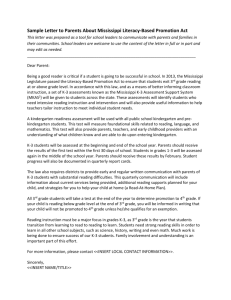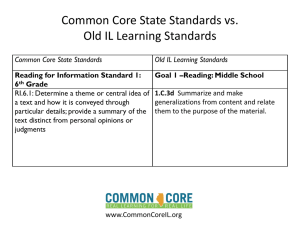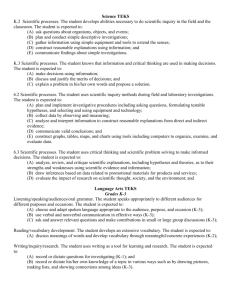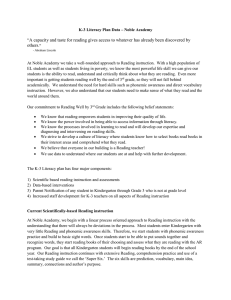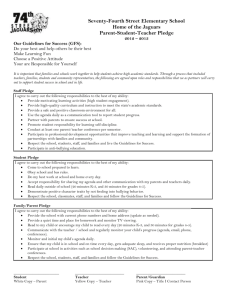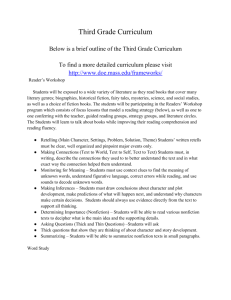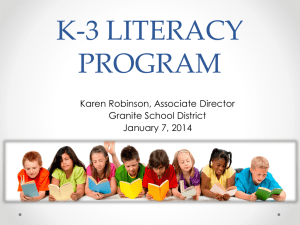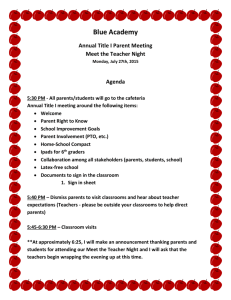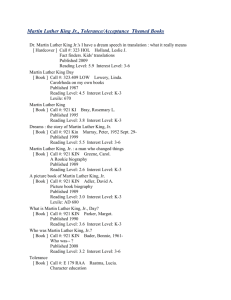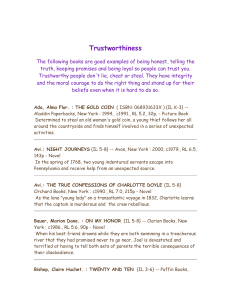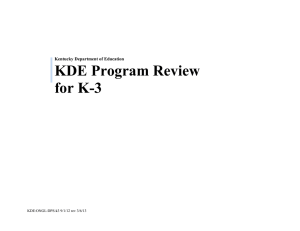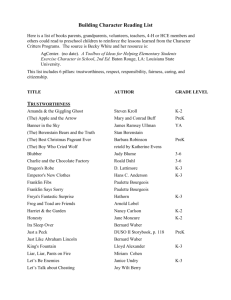Session I 10:15 – 11:00 Session II 11:15 – 12:00 Session III 2:00 – 2
advertisement
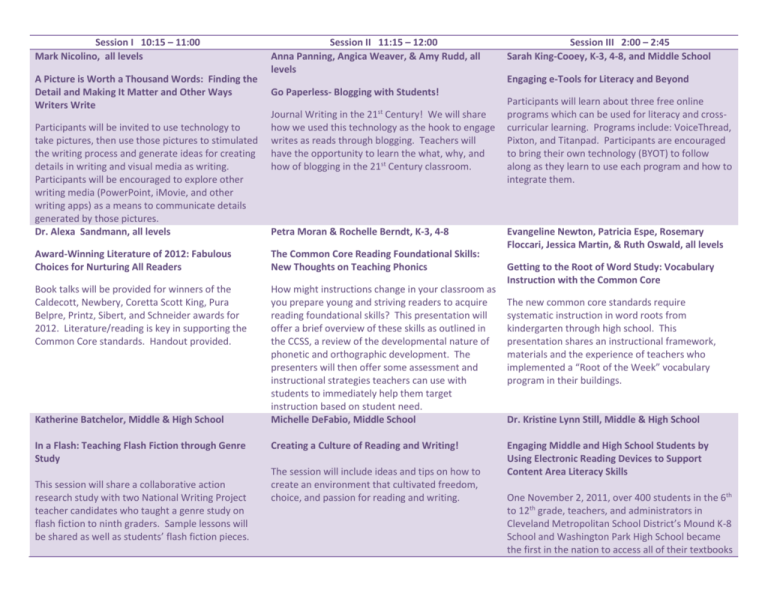
Session I 10:15 – 11:00 Mark Nicolino, all levels A Picture is Worth a Thousand Words: Finding the Detail and Making It Matter and Other Ways Writers Write Participants will be invited to use technology to take pictures, then use those pictures to stimulated the writing process and generate ideas for creating details in writing and visual media as writing. Participants will be encouraged to explore other writing media (PowerPoint, iMovie, and other writing apps) as a means to communicate details generated by those pictures. Dr. Alexa Sandmann, all levels Session II 11:15 – 12:00 Anna Panning, Angica Weaver, & Amy Rudd, all levels Go Paperless- Blogging with Students! Journal Writing in the 21st Century! We will share how we used this technology as the hook to engage writes as reads through blogging. Teachers will have the opportunity to learn the what, why, and how of blogging in the 21st Century classroom. Petra Moran & Rochelle Berndt, K-3, 4-8 Award-Winning Literature of 2012: Fabulous Choices for Nurturing All Readers The Common Core Reading Foundational Skills: New Thoughts on Teaching Phonics Book talks will be provided for winners of the Caldecott, Newbery, Coretta Scott King, Pura Belpre, Printz, Sibert, and Schneider awards for 2012. Literature/reading is key in supporting the Common Core standards. Handout provided. How might instructions change in your classroom as you prepare young and striving readers to acquire reading foundational skills? This presentation will offer a brief overview of these skills as outlined in the CCSS, a review of the developmental nature of phonetic and orthographic development. The presenters will then offer some assessment and instructional strategies teachers can use with students to immediately help them target instruction based on student need. Michelle DeFabio, Middle School Katherine Batchelor, Middle & High School In a Flash: Teaching Flash Fiction through Genre Study This session will share a collaborative action research study with two National Writing Project teacher candidates who taught a genre study on flash fiction to ninth graders. Sample lessons will be shared as well as students’ flash fiction pieces. Creating a Culture of Reading and Writing! The session will include ideas and tips on how to create an environment that cultivated freedom, choice, and passion for reading and writing. Session III 2:00 – 2:45 Sarah King-Cooey, K-3, 4-8, and Middle School Engaging e-Tools for Literacy and Beyond Participants will learn about three free online programs which can be used for literacy and crosscurricular learning. Programs include: VoiceThread, Pixton, and Titanpad. Participants are encouraged to bring their own technology (BYOT) to follow along as they learn to use each program and how to integrate them. Evangeline Newton, Patricia Espe, Rosemary Floccari, Jessica Martin, & Ruth Oswald, all levels Getting to the Root of Word Study: Vocabulary Instruction with the Common Core The new common core standards require systematic instruction in word roots from kindergarten through high school. This presentation shares an instructional framework, materials and the experience of teachers who implemented a “Root of the Week” vocabulary program in their buildings. Dr. Kristine Lynn Still, Middle & High School Engaging Middle and High School Students by Using Electronic Reading Devices to Support Content Area Literacy Skills One November 2, 2011, over 400 students in the 6th to 12th grade, teachers, and administrators in Cleveland Metropolitan School District’s Mound K-8 School and Washington Park High School became the first in the nation to access all of their textbooks Terry Benton, K-3, 4-8 Dr. Brandi Noll, K-3, 4-8 Selecting and Using Nonfiction Books A Successful, Authentic, and Engaging Trifecta: Integrating Phonics, Reading, and Writing Instruction This session will suggest ways to find and use nonfiction children’s books, with a special focus on nonfiction picture books. from their individual electronic reading devices. This is the Bookshelf Project. At its core, the project strives to improve the way students learn, but is doing so much more. Please attend this session to learn about the ways in which middle and high school teachers are using these devices to support content area literacy instruction. Additionally, hear firsthand, from the students about the benefits they are gaining through their involvement in this innovative project. Denise Kozlina-Deceder, K-3, 4-8 Reading for Meaning- Fluently Read Naturally combines three research-proven strategies (teacher modeling, repeated reading, and progress monitoring) to accelerate the reading development of students who receive reading services from Title 1, LS, ELL. This strategy is also effective for beginning readers. This presentation explains the part fluency plays in the reading process. Dr. Don Martin & Dr. Magy Martin, K-3 Far too often teachers separate phonics instruction from meaningful and authentic reading and writing experiences. Through integration of these three instructional constructs, students are better able to learn phonics skills that actually contribute to improved reading and writing. A variety of instructional techniques will be shared in regard to how teachers or interventionists who work with students in grades K-5 can truly integrate phonics in order to advance the reading and writing abilities of students. Karen Brucken, K-3 Childhood Obesity: Helping Children Through Reading Simple Solutions to Build Fluency and Vocabulary in Seconds “Use it Again”: Strategies for Reading and Writing using the topic of “Recycling” The presenters will discuss the dynamics of childhood obesity. In addition, they will have a new book they have written which uses a dog to help a young girl learn healthy behaviors. The session will provide teachers with research based activities, which have been modified or expanded upon, that will increase students’ vocabulary and fluency and can be done quickly. Activities will include the use of sight words to improve vocabulary, repeated readings using poetry, and making words. Using the topic of “Recycling”, participants will be introduced to methods that can springboard a fictional picture book into a non-fictional topic and assist with understanding the differences in text formats. Simplistic strategies will be demonstrated that can promote links between reading and writing, and help build students’ questioning skills as they negotiate non-fictional texts. Susi Turner & Linda Smith, K-3, 4-8 Amy Neral, Middle & High School Paula Saine, 4-8, Middle School Brandi Gribble Mathers, Middle & High School Beyond Books Using Digital Technology to Inspire Struggling Readers and Writers in Middle School Using Café Culture to Motivate Adolescent Readers The presenter will share ways digital technologies inspired middle school students as they approached reading and writing of varying levels of complexity. Attendees are invited to bring their own digital devices to access the Internet and engage in authentic hands-on learning. Looking for a way to motivate adolescent readers? Why not transform your school library into a literary café? Come hear the story of a local middle school who is doing just that! This presentation begins with a review of the literature to support such an undertaking and concludes with a practical action plan for transforming your middle or high school library into a warm, inviting, and lively literary café. Kristine Pytash and Kaybeth Calabria, Middle & High School Dr. Gail Saunders-Smith, K-3, 4-8, Middle School Intimidated by ebook downloads? Worried about how to incorporate all of the new technology into your classrooms without blowing your budget? Overwhelmed? Learn where to go for help. Crystal Ratican, K-3 iPads and Read-Alouds What We Say Does Matter 2012 Best Books for Young Adults This session will provide participants with information on how to effectively use iPads to create an advantageous read-aloud experience for elementary students. Participants will leave with information on the benefits of read-alouds during the school day and specific websites that they may use immediately inside their classrooms. Participants are encouraged to bring their own iPads to use during the presentation. This presentation will explore the 2012 best books for middle school and high school classrooms as recommended by the American Library Association. The presentation will highlight the Young Adult Library Services Association’s Excellence in Nonfiction. The presentation will also provide instructional ideas for using the books in middle and high school classrooms. Learn about the types of teacher talk we use every day. Find out about coaching statements, questions, and prompts for inquiry and meta cognition by examining teacher-student interactions.
